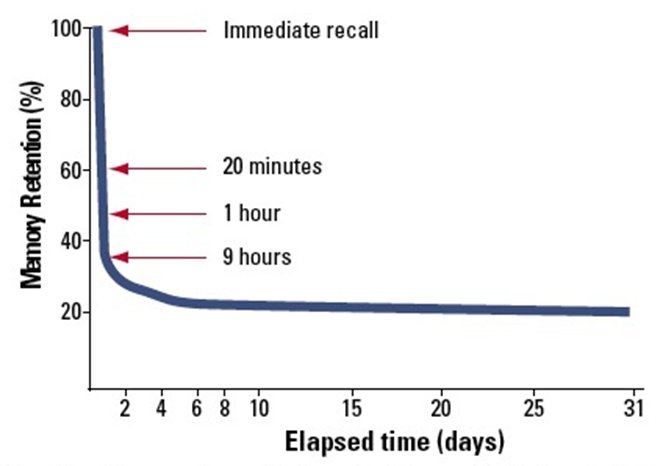W
e live in the future. Cars drive themselves. Robots win trivia games. Scientists create new entities with a few genetic modifications. Drones roam the skies. Technology is growing exponentially, forcing us to repeatedly learn and adjust to an ever-shifting landscape. We are prey to Moore’s Law.
Technology doubles every two years – Moore’s Law
Far from being detrimental to our inter- and intra-personal growth, the incredible interconnectivity that results from our current information age provides numerous benefits that we take advantage of every day. One such benefit is our access to information. Information has always been abundant and available, but never before have we been able to access it as quickly as we can today. Data enabled smartphones, fiber optic lines at home, and free wifi in public places has created an always connected ecosystem. The ability to stream music and videos over the internet shows just how quickly data can be accessed.
The benefit of connectivity has been compounded by two other technological innovations: cross platform apps and cheap storage. We can now use apps on our phones, laptops, tablets, and even TV’s to find information on demand. We’re almost always close to one of our many devices, meaning we’re just a click, swipe, or tap away from a wealth of knowledge.
At the same time, the cost of storage has gotten cheaper. The consumer has witnessed the progression from Gigabytes to Terabytes, the increasing capacity of USB drives, and the rise of cloud storage. Cheaper storage means more information is available to be stored and accessed online. This triumvirate of connectivity, cross-platform apps, and storage has unlocked the value of all the information in the world today.
What would it be like to never forget?
When it comes to information, the value of it comes in remembering. Being able to remember enriches our conversations, ideas, beliefs, and lives. The problem is, remembering isn’t so easy. Our memories get fuzzy overtime, as we forget details or add things to our stories that never even occurred (check out this TED Talk on this very subject). On a higher level, our ability to remember is well explained by The Ebbinghaus Curve of Forgetting which shows our retention of information overtime.

Ebbinghaus curve of forgetting
There’s an exponential relationship of how well we remember something as time goes by. Research has shown we only recall about 20% of something we encountered only one time. As you revisit the idea, thought, or memory multiple times, retention increases. Rarely revisiting an idea makes it harder to recall and thus retention decreases. But do we need to revisit every idea we’ve ever come across again and again to ensure total recall?
The answer is no. We used to be bound by memory in our brain, space in our notebook, storage on our hard drive, but no longer. The future has arrived in the advent of the Extended Mind. We use it all the time without realizing it. Here’s how.
The Social Cloud
Examples: Dropbox, Evernote, Twitter, Facebook, Spotify, Flickr, Instagram, Tumblr, Pinterest, Foursquare, etc
The social cloud is one of the two parts of the Extended Mind that we utilize every day, from our photos automatically syncing to Dropbox, Spotify playing our favorite music, Evernote storing all of our notes, or Facebook documenting our daily life. The examples are endless. The social cloud is essentially any social service that we interact with to create a unique environment, suited to our personal needs. Every social service that we opt into, is creating a personal space and documenting our interactions on that platform. More importantly, it’s become easier than ever to do so.

An Instagram photo I posted at a festival in Dallas a few months ago. Looking at this again triggered a number of memories I had completely forgotten about.
Rather than printing our photos, carrying around our books, or writing in journals, we have a digital copy of everything that is easy to access on our handy smartphones. We can possess entire libraries of books (Kindle), music (Spotify), photos (Instagram), or videos (YouTube) in the palm of our hands.
At the same time, it’s easier than ever to hop onto your Facebook Timeline (or Instagram as seen above) and scroll through the major events in your life: status updates, check-ins, photos, and conversations. This is a prime example of living in a connected world, where our memories are enhanced by the swipe of our finger and we are able to revisit past events, reminiscing about moments we’d otherwise forget.
The Extended Mind doesn’t end with these social services; it applies to every piece of information we have access to online.
The Information Cloud
Examples: Google, Youtube, Wikipedia, Wolfram Alpha, blogs, search engines, etc
A few months ago, I was in the middle of nowhere Indiana at a cottage for a bachelor party. No data, no internet, and no cell service. We were discussing Judd Apatow films and one of the guys mentioned that this actress in one of his movies was hot, but couldn’t remember the name. There was no service, so we couldn’t just look it up like we typically would. We struggled for a while…
“Katherine Heigel?”
“No, no, the other one.”
”Elizabeth Banks?”
“No, wrong movie, she’s in Knocked Up.”
“Oh Leslie Mann!”
Under normal circumstances one of us would pull out his smartphone, hop onto IMDB, and have the answer in seconds. This is just one of the many situations that we rely on the Extended Mind for. It was both a reminder of how useful it can be, as well as how reliant we have become on it. Looking up traffic delays, weather forecasts, show times and random facts are other typical examples. The phrase ‘just Google it’ is a normal part of our lexicon today.
Our uses aren’t limited to just arbitrary fact checking though, we also utilize the information cloud to research and learn about work tasks, new ideas, and personal interests.
The information cloud is just a fancy word for the rest of the internet – essentially the hundreds of millions of websites we use to find information we desire. Google, Wikipedia, Youtube – the entire internet is our database to explore to our heart’s content.
Our knowledge is no longer bound by what we know, but what we are able to discover through technology.
Why does this matter?
The extended mind has several great benefits and solves several problems, but also creates some new ones.
The Benefits
1. Information On Demand
Access to information has never been easier. We can look up situational information in a matter of seconds from any number of devices. Furthermore, we now have a choice on whether we wish to commit something to memory or rely on the extended mind to remember it for us.
The value of having this choice completely changes how we learn. We no longer need to rely on rote memorization of facts, when the extended mind can instead. If used correctly, we can increase our learning abilities, picking and choosing what to use the Extended Mind for, and being able to focus more on creating and less on memorization of facts.
2. Seamless Logging
Logging of life events is easier than ever. It no longer takes massive amounts of time to save your memories and milestones. Auto-upload, GPS, smartphones, apps, and connectivity all work together to make the process seamless.
In fact, people called Lifeloggers go so far as to document every moment of their lives. Using specialized devices, they are able to take photos, record audio, and essentially create a journal of their every waking moment. Deb Roy, an MIT researcher, created a video camera network in his home to log how his newborn child learned to speak (check out the TED Talk). Logging is easier than ever and the innovations it can lead to are just as intriguing.
3. Knowledge Was Power
The playing field has been levelled. Previous experts who couldn’t be touched because of the barriers of knowledge needed, can now be challenged by amateurs who simply have peaked an interest in a subject. While not great for experts, it’s amazing for amateurs. Knowledge was power and now knowledge is everywhere.
Furthermore, we no longer need to focus on a single thing to specialize in and close all other doors. Things are more favorable to the generalist approach and being able to find and process the wealth of information we have access to. This also increases the opportunities of innovation, as ideas are easily accessible, making the intersection of different subjects and perspectives far more likely.
The Challenges
1. Saving Is Easy, Finding Is Hard
Having our lives logged and infinite information at our finger tips is great, but only if we’re able to find what we want. Remember that time you were looking for a file on your hard drive but couldn’t find it? Organizing information will become essential for the Extended Mind to be of real value.
The problem is the amount of information that needs to be organized. The internet is one thing, but even our personal computers get disorganized faster than we care to admit. Organizing takes a lot of time, so technological advances in this area will be the next innovation needed to further realize the benefit of The Extended Mind.
2. Information Everywhere
Information overload becomes more relevant than ever. It’s all there and easier than ever to access. It will be a struggle to not get lost in the sea of information and stay connected to the real world.
There is also a fear that all of this will make us stupider – as we won’t use our memories as much, relying more on technology. Studies aren’t able to confirm or refute this concern, but it will be important that we are mindful of how the Extended Mind affects our lives and adapt.
3. Quality Control/Curation
Quality of content will become a major factor. Information is easily available, but what is a good source? As the internet continues to grow, some sort of validation will be important. Currently we use the media outlet as a sign of quality, but as the internet continues to grow, we’ll need better processes in place to determine what is good content.
Curation is one possible solution to this problem, but even curators will have trouble keeping up with the rapidly growing amount of information available online.
The intersection of connectivity, cross-platform apps, and unlimited storage has created the Extended Mind, both as a social and informational tool that we can leverage every day. Having instant access to information will change how we learn, how we remember, and what we can accomplish, but also comes with a number of challenges. Ultimately, it signals a shift in how we do things, amplifying our individual abilities with limitless memory.
The future has arrived.


